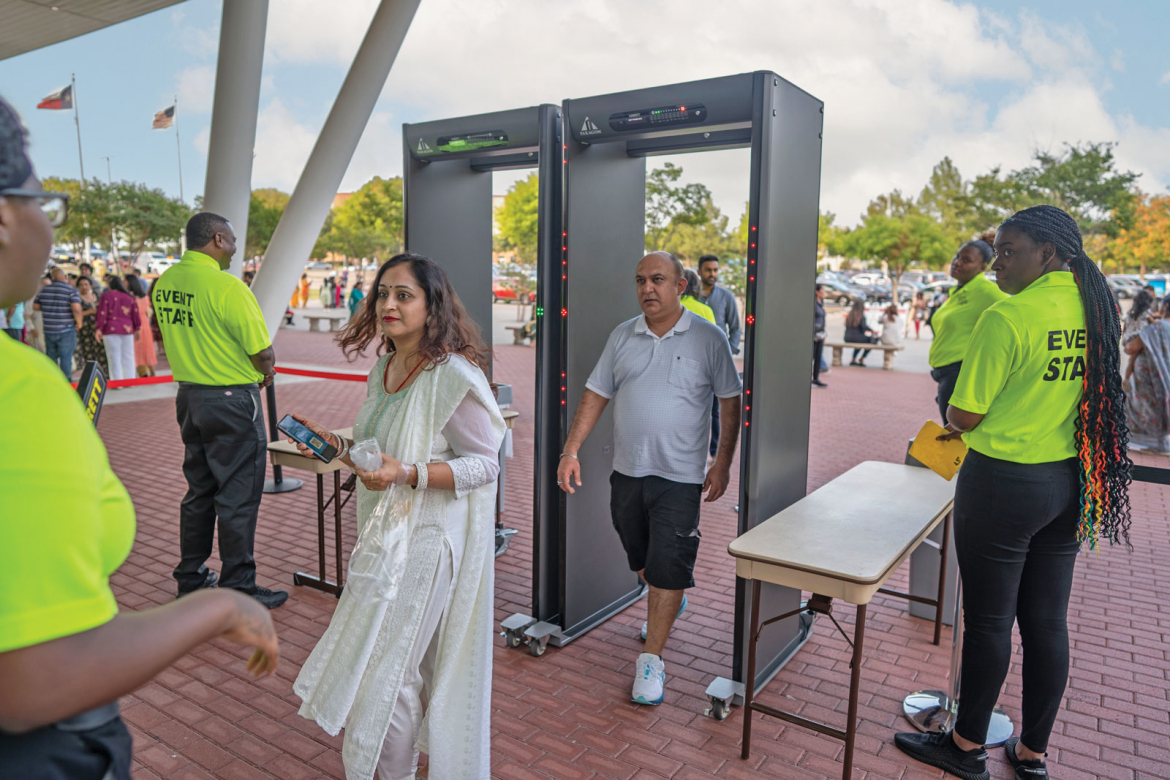Yes, titanium can set off metal detectors, even in airport security settings. Even though titanium is a non-ferrous metal and has less magnetic properties than iron and stainless steel, its presence can be detected by the technology in modern security systems.
Understanding Metal Detectors and How They Work
Metal detecting equipment uses electromagnetic fields to identify the presence of metal objects. These systems emit the magnetic field from the search coil into the ground (for ground search detectors) or surrounding area (for other hand-held and walk-through detectors). When this field encounters a metal object, the detector signals an alarm, alerting the user of the presence of metal.
Common Types of Metal Detectors
There are two common types of metal detectors used in security:
- Hand-held metal detectors
- Walk-through metal detectors
Hand-Held Metal Detectors
Hand-held detectors are compact, portable devices often used for additional screening and detailed inspections. These detectors are commonly used by security personnel to scan individuals at entry points and to pinpoint targets detected by a walk-through metal detector. Their portability makes them versatile for use in a variety of settings, from airports and schools to government buildings and concert venues.
Walk-Through Metal Detectors
Walk-through metal detectors, often seen at airports, government buildings, and large events, are larger full-body scanners that individuals pass through. These devices efficiently screen large volumes of people, making them ideal for environments where high throughput is necessary.
Each type of detector is designed to meet different operational needs, with walk-through models allowing for faster processing of individuals and hand-held detectors providing detailed scanning capabilities.
Ferrous and Non-Ferrous Metals
When detecting between ferrous and non-ferrous metals, the difference lies in the type of metal detector being used. If only ferrous metals are able to be detected, it’s considered a magnetometer and not a true metal detector. Magnetometers rely on passive magnetic fields from the Earth’s surface, while true metal detectors generate their own magnetic field.
- Ferrous Metals: Objects that contain iron and are typically magnetic, such as carbon steel and cast iron.
- Non-Ferrous Metals: Objects that are not iron-based, such as titanium, copper, and aluminum. Although they have less magnetic properties, they can still be detected due to their density and the amount present in objects like medical devices and orthopedic implants.
Modern metal detectors have advanced program settings, allowing security personnel to fine-tune the equipment to detect various metal materials and object sizes. This capability ensures that security systems are thorough, adaptable, and capable of meeting diverse security challenges.
Titanium and Its Interaction with Metal Detectors
Pure titanium, known for its strength and lightweight properties, has low magnetic conductivity, making it generally undetectable by standard metal detectors under typical conditions. This is because metal detectors are usually calibrated to detect metals that have more magnetic properties.
However, when titanium is alloyed with other metals or present in significant amounts, it's more likely to be detected. Examples of situations where titanium could affect the detection process include:
- Titanium rods used in partial knee or hip replacements
- Spinal rods and plates used in spinal surgeries
- Titanium screws found in dental implants
- Pacemakers, defibrillators, bone growth stimulators
Comparing Titanium with Other Metals
Titanium's properties differ significantly from other metals used in medical implants, such as stainless steel and cobalt chrome. These metals have high magnetic conductivity, which increases their likelihood of triggering a security alarm at checkpoints.
In contrast, titanium has less magnetic properties, which means it often requires the metal detector to be set to alternative program settings for detection. This is especially relevant in situations involving smaller titanium implants that might otherwise pass through standard security screenings unnoticed.
Airport Security and Metal Detection
Airport security is critical to ensuring the safety of all passengers and staff. In these settings, metal detectors play an important role, scanning thousands of travelers every day for any metal objects that could pose a security threat. This equipment, both hand-held and walk-through, is designed to identify a wide range of metals. This includes everything from metals with high magnetic conductivity to ones that are less magnetic, ensuring that nothing harmful passes through the security zone.
As we've mentioned, the way different metals interact with airport metal detectors varies based on their magnetic properties. Metals like iron and stainless steel are easily detected, while non-ferrous metals like titanium might require alternative settings to be detected. Security guards and staff carefully adjust the settings and calibration of these detectors so they can differentiate between everyday items like belt buckles and artificial knee plates, and potential threats like guns, knives, and other weapons.
The Role of TSA Agents and Security Staff
When thinking about airport security and the operation of metal detectors, TSA agents play an indispensable role. These professionals are not only responsible for operating the metal detectors and x-ray machines at security checkpoints. They also make judgment calls based on the alerts from these machines.
The expertise of a TSA officer is crucial in maintaining a smooth flow of traffic through security lines and upholding the highest safety standards. They help ensure that each passenger is screened effectively without compromising the efficiency of the overall security process. The ultimate goal is to keep airport operations moving smoothly even through these processes.
Procedures for Individuals with Medical Implants and Devices
For travelers with medical implants, the TSA advises them to inform the TSA officer of their situation, and they might not be required to go through the walk-through metal detector.
Garrett's Expertise in Metal Detection
At Garrett, we design and manufacture metal detectors that are capable of differentiating between potential threats and non-threatening objects like a knee replacement or joint replacement. Our advanced technology is designed to identify various metal types, ensuring that everyday items don't trigger false alarms. This precision is critical in high-security environments like airports, where the balance between security and efficiency is essential.
Reliable Metal Detectors
Garrett's metal-detecting equipment offers significant advantages, including:
- Enhanced security across various applications and settings
- High-security standards at airports and other sensitive environments
- Accuracy and reliability ensure that all security checks are thorough, without slowing down the process
Whether for walk-through screenings at main checkpoints or secondary screenings with hand-held wands, our airport metal detectors are trusted to deliver superior performance and peace of mind.
For security professionals and organizations looking for reliable security solutions, reach out to Garrett today! See how our metal-detecting equipment can meet your security needs and enhance the standards of safety at your facility.
Resources:
- Garrett. https://garrett.com/
- “Titanium.” Britannica. https://www.britannica.com/science/titanium
- Transportation Security Administration. https://www.tsa.gov/








